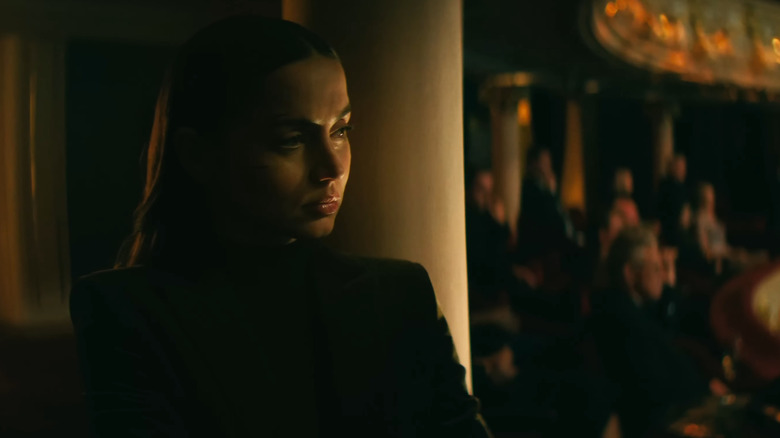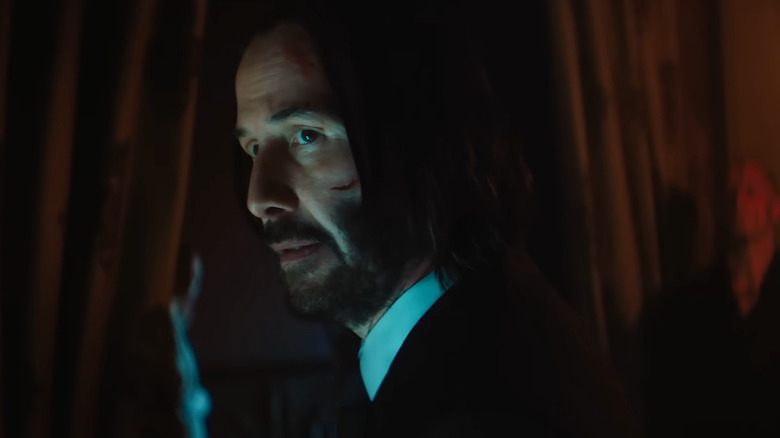The Biggest Problem With A John Wick Cinematic Universe Is John Wick Himself
This article contains spoilers for "Ballerina."
If there's one thing the industry is deathly allergic to when it comes to franchise filmmaking, it's finality. I'll never forget going to see "John Wick: Chapter 4," a strikingly beautiful action epic for the ages, and arriving at the film's final moments. The blocking of a sunrise overlooking a cemetery all but premeditated a shot of its legend hiding in the distance, but to my pleasant surprise, the film simply ended. The legendary John Wick (Keanu Reeves) was dead, and that was that. I've rarely felt so relieved to see such a bold and concrete statement from a franchise that could have milked this character dry. It was a nice thought.
Spin-offs of the Wick-verse were inevitably going to happen, but Lionsgate doing everything in their power to nudge Chad Stahelski into willing "John Wick: Chapter 5" into existence feels so deflating. For four films, Reeves' relentless merchant of death evaded the ultimate fate by stoking the flames of his inner humanity in order to die on his own terms, and he did. I hadn't given much thought to the idea of exploring this world without him because it was clearly constructed entirely with Wick's presence in mind.
When "John Wick" came out, not only was its balletic gun-fu sensibilities a jolt to the system of making action movies, but so was its world-building. You could glean so much information about this ecosystem of assassins with very little. The sneak peeks within this world's many pockets made your mind wander without the film having to kill its own momentum in order to explain it. That first film feels so quaint in hindsight now. It starts to get exhausting knowing little tidbits of a larger universe doesn't inspire imagination, so much as potential spin-off fodder. The machine never stops, not even for "John Wick," so the best thing you can hope for is someone else to come along and put their own stamp on it. Can the world of "John Wick" survive without, well, John Wick?
Well, there was that 3-episode event series from 2023 about a young Winston (Colin Wooddell) making his way up the ranks. What? You don't remember that? "The Continental" was the first Wick-verse project to capitalize on the groundbreaking film series, with less than stellar results. It made as much impression as most shows dumped onto streaming venue's endless graveyard of forgotten programming, receiving middling reviews at best. You can put "From the World of John Wick" to clue audiences in, but without Reeves' presence front and center, it might as well be invisible.
The next entry in the Wick-verse wouldn't make this mistake again as that tagline is not only relegated to the top of the title, but "Ballerina" would make it abundantly clear that Reeves is actually in this one. The film isn't meant to be a "John Wick" movie, but a kick-ass franchise starter for Ana de Armas' Eve Macarro. It features some eye-popping action sequences with flamethrowers, yet buckles under the weight of its own mediocrity. /Film's Chris Evangelista shares a similar sentiment in his review. Once the Baba Yaga enters the film, however, it presents a very clear image of how limiting the Wick-verse is with and without Reeves.
Ballerina struggles to break free of John Wick's shadow
In an effort to delve deeper into the perspective of a branch we're slightly familiar with already, "Ballerina" sets its sights on the Ruska Roma dance academy introduced in "John Wick: Chapter 3." Whereas Wick is basically a freelance contractor, Eve Maccaro (Ana de Armas) operates under the watchful eye of the school's Director (Anjelica Huston). After an extensive 12 year training course, Eve is finally allowed to go out on missions and becomes a capable assassin in the process, albeit not much of an interesting one.
The exact timeline mechanics are strange, but we know "Ballerina" largely takes place between "Chapter 3" and "Chapter 4." While on a job, Eve discovers a large scar in the form of an X that matches the same mark of the killers who murdered her father when she was a child. Eve gets a taste of revenge (surprise, surprise) and defies her orders to not pursue the matter further, which prompts the Director to make a phone call to a name we all know pretty well by now.
I'm not saying de Armas isn't worthy of being in these movies, but there isn't enough in "Ballerina" to pave a future worth following with Eve. It's not so much de Armas' fault. She steals "No Time to Die" out from under Daniel Craig, with a fantastic action sequence that practically acts as an audition to entrust her with an action movie of her own. But Shay Hatten's prosaic screenplay comes across as if anyone else could have played this character with the same boring results.
The brief scene early on where Eve shares a moment with the recently-excommunicated Wick is short enough that it works as a "the future is yours" passing of the torch. But when Wick enters the film for the second time as a hired hand, it accentuates the film's flaws tenfold and devalues Eve in her own movie. He arrives in Hallstatt under orders to kill her, yet gives her enough time to fulfill her revenge quota. In the climax of "Ballerina," Gabriel Byrne's Chancellor, who possesses the charisma of driftwood, hears that Eve has slaughtered a good chunk of his heavily armed Cult on her own, but doesn't move to safety until he learns the Baba Yaga has joined the fight.
We're told the Cult is a formidable foe of fringe assassins that's been operating for the better part of 1,000 years alongside the High Table. They're even more dangerous versions of the killers we've already met. But not only does Eve, still a relative newcomer, take them out in succession, the group itself is as generic as they come. They feel redundant in the face of four movies where the assassins are already doing open business in public and breaking Continental rules. The latter is basically a Tuesday for them. Their worst offense is the lack of memorable personalities clashing against its protagonist.
The glaring issue with the Wick-verse is once we start opening up more heard, but not seen, pockets of this world without its central character, it makes the whole enterprise wildly less interesting. Even by the end of "Chapter 4," we still haven't met all the ranking members of the High Table. There's still some mystery there. The further revelations within each "John Wick" sequel are all in tandem with the titular assassin's personal odyssey. Subsections of killers, for whom death is as much a cultural institution as breathing, act in accordance with the challenge of taking down a force of nature . Now that's a compelling hook.
"Ballerina" comes alive whenever Reeves is on screen because these movies already know how to utilize his talents as an actor and stuntman. De Armas, meanwhile, is trapped in this limbo where she can't help but be in his shadow. By film's end, not only has Eve has completed her journey into becoming Wick's replacement, going so far as to adorn herself in a similar outfit complete with a similar black suit garb, her sequel tease is the same "on the run" hook of "Chapter 2," and I find that such a boring development.
One of the most egregious sins of the Wick-verse is failing to find its own voice in the face of a franchise revitalization.
Keanu Reeves and Chad Stahelski are the foundation of the Wick-Verse
Len Wiseman's filmography leaves a lot to be desired, but I was cautiously optimistic when he was tapped to direct "Ballerina." I have a soft spot for the gothic atmosphere of the first "Underworld." Kate Beckinsale transformed into a bankable action star of the 2000s, and I believed there was room for Wiseman to do the same for de Armas. Unfortunately, "Ballerina" not only walks back its faux-Black Widow training in favor of Eve becoming more Wick-like, but the film gets lost in a cobbled-together clashing of tones.
The aspect of "Ballerina" that most have laid praise to is the action. It has all the hits, stabs and grenade fights you would expect from a "John Wick" movie. If they feel like they stand out from the film's generic makeup, then that's because they very rarely feel under the guise of Wiseman's direction. "Ballerina" was delayed a full year to put some action sequences back into the film, with Stahelski jumping to helm them – and it's a massive distraction.
The pure physicality and personality of the "John Wick" movies only got better and better, as each installment pushed Stahelski and Reeves to push their craft even further, as shown in the documentary "Wick is Pain." These movies are more than the cool moments. A large part of it is Reeves' performance, as he has to navigate being the world's most unkillable man, who can also be quietly fallible in his own way. The antagonistic forces of the Wick-verse cater to his Buster Keaton-esque presence.
The best scenes in "Ballerina" are when Stahelski takes over the director's seat, such as when Eve and a deadly chef smash each other in the head with plates like they're in a Sam Raimi movie. The issue is that Stahelski translates his influences of world cinema into his work, which often clashes against Wiseman's otherwise routing framing. When the "John Wick" movies conjure the violent spirits of the silent clowns, it's seamlessly ingrained in the DNA of the film. These sequences in "Ballerina," however, often cause a discordance with the film at hand, partly because they're tonally disconnected from the rest of it. Add Stahelski's bone-crunching fight choreography and you have a feature divorced from becoming its own thing. In terms of visual identity, the absence of Dan Lausten's layered, eye-popping cinematography stands no chance against Romain Lacourbas' flat aesthetic, which shows how unremarkable these movies can look even with colors.
The two Wick-verse spin-offs prove that this universe just doesn't work without Stahelski nor Reeves, whether either of them are brought in as a Hail Mary save or outright ignored. Stahelski won't always be able to come in and save these movies. If this world is to continue, which it most likely will, it needs to bring in more visually dynamic filmmakers willing to put their own stamp on it. Donnie Yen is set to direct the upcoming "Caine" spin-off, with no planned appearance from Reeves. Unless the Wick-verse radically changes, it will always be in Baba Yaga's shadow.
"Ballerina" is now playing in theaters nationwide.


